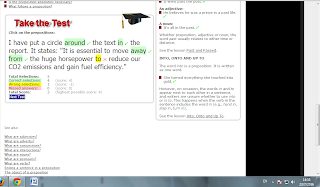Prepositions
Preposition
ต่อไปนี้ใช้ได้ในหลายกรณี
1. at ใช้กับสถานที่ แปลว่า ที่
เช่น
at the
station = ที่สถานี at the office =
ที่สำนักงาน
at the
bank = ที่ธนาคาร (หมายถึงจุดตำแหน่งของสถานที่นั้น)
at
ใช้กับเวลา แปลว่า เมื่อเวลา
เช่น
at 8
o’clock = เมื่อเวลา 8 นาฬิกา
at noon =
เวลาเที่ยงวัน at midnight =
เวลาเที่ยงคืน (หมายถึงจุดหนึ่งของเวลา)
2. in ใช้กับสถานที่แปลว่า ใน
เช่น
in the box
= ในกล่อง, in the house =
ในบ้าน
in Bangkok
= ในกรุงเทพ, in Thailand =
ในประเทศไทย (หมายถึงภายในสถานที่, พื้นที่)
in
ใช้กับ เดือน, ปี,
ฤดู, ช่วงระยะเวลาแปลว่า ใน
เช่น
in the
morning - ในเวลาตอนเช้า
in june =
ในเดือนกรกฎาคม, in summer =
ในฤดูร้อน, in 1999 = ในปี 1999
3. on ใช้กับ สถานที่แปลว่า บน
เช่น
on the
table = บนโต๊ะ, on the tree =
บนต้นไม้
on silom
street = บนถนนสีลม, on my head =
บนศรีษะของฉัน
on
ใช้กับวัน, วันที่,
วันสำคัญต่างๆ แปลว่า ใน
เช่น
on Monday
= ในวันจันทร์
on Janury
2 = ในวันที่ 2 มกราคม, on my birthday =
ในวันเกิดของฉัน
4.
โดยทั่วไปแปลว่า เพื่อ,
สำหรับ
เช่น
for you =
เพื่อคุณ, for me = เพื่อฉัน
for people
= เพื่อประชาชน, for our country =
เพื่อประเทศของพวกเรา
for
ใช้กับเวลาแปลว่า เป็นเวลา
เช่น
for ten
minutes = เป็นเวลา 10 นาที
for two
weeks = เป็นเวลาสองสัปดาห์, for two years =
เป็นเวลาสองปี
5. since แปลว่าตั้งแต่
ใช้บอกจุดเริ่มต้นของเวลาและเหตุการณ์นั้นๆ เช่น
since
1995 = ตั้งแต่ปี 1995, since last year. =
ตั้งแต่ปีที่แล้ว
6. during แปลว่าระหว่าง
(เวลา) เช่น
during the
summer = ระหว่างฤดูร้อน
during my
vacation = ระหว่างวันหยุดของฉัน
(บอกความต่อเนื่องของเวลา)
7. between แปลว่า ระหว่าง
(สองสิ่ง) เช่น
B is
between A and C= B อยู่ระหว่าง A
และ C
Jenny is
sitting between John and Tom. =
เจนนี่กะลังนั่งอยู่ระหว่างจอห์นและทอม
8. among = แปลว่า ระหว่าง
(สามขึ้นไป) เช่น
C is among
A, B and D = C อยุ่ระหว่าง A, B
และ D
Jenny is
among Tom, John and Jack = เจนนี่อยู่ระหว่างทอม
จอห์น และแจ๊ค
9. over แปลว่า เหนือ
(ตรงแนวดิ่งขึ้นไป) เช่น
The sun is
over our heads at noon.
ดวงอาทิตย์ตรงศรีษะของพวกเราในเวลาเที่ยงวัน
1 10. above แปลว่า เหนือ
(ตรงไหนก็ได้ที่สูงกว่า) เช่น
The plane
is above our heads.
เครื่องบินอยู่เหนือศรีษะของเรา (ตรงไหนก็ได้)
ตัวอย่างการใช้
Preposition
I was born
in Bangkok.
ฉันเกิดในกรุงเทพ
I was born
in July in 1980.
ฉันเกิดในเดือนกรกฎาคม ในปี 1980
I have a
ruler in my school bag.
ฉันมีไม้บรรทัดในกระเป๋าโรงเรียนของฉัน
I am
interested in
English.
ฉันสนใจในภาษาอังกฤษ
I have no
trust in his words.
ฉันไม่ไว้วางใจในคำพูดของคุณ
This
material is made in Thailand.
วัตถุนี้ทำในประเทศไทย
I don’t
work on Sundays.
ฉันไม่ทำงานในวันอาทิตย์
I go to
school on
foot.
ฉันไปโรงเรียนด้วยเท้า (เดินไป)
I
congratulate you on your success.
ฉันขอแสดงความยินดีในความสำเร็จของคุณ
My English
book is on the table.
หนังสือภาษาอังกฤษของฉันอยู่บนโต๊ะ
She
insisted on going to the
zoo.
หล่อนยืนยันว่าจะไปสวนสัตว์
I didn’t
do that on purpose.
ฉันไม่ได้ทำสิ่งนั้นโดยเจตนา
I am good
at
English.
ฉันเก่งภาษาอังกฤษ
I’ll be
back at 10
o’clock.
ฉันจะกลับมาเมื่อเวลา 10 นาฬิกา
He looked
at me angily yesterday.
เขามองดูฉันอย่างไม่พอใจเมื่อวานนี้
I smile at
her every
day.
ฉันยิ้มให้หล่อนทุกวัน
I live at
123 Taksin Soi
24.
ฉันอาศัยอยู่บ้านเลขที่ 123 ซ. ตากสิน 24
He is
laughing at you
now.
เขากำลังหัวเราะเยาะคุณขณะนี้
I’m
waiting for you
now.
ฉันกำลังคอยคุณอยู่ขณะนี้
I have
worked here for six years.
ฉันได้ทำงานอยู่ที่นี่เป็นเวลา 6 ปี
I’m
leaving for the
office.
ฉันกำลังออกไปจากสำนักงาน
I can buy
a ring for
you.
ฉันสามารถซื้อแหวนให้คุณได้
I’m
looking for a job
now.
ฉันกำลังหางานทำขณะนี้
I can do
it for you.
ฉันสามารถทำให้คุณได้
I go to
school by bus every day.
ฉันไปโรงเรียนโดยรถเมล์ทุกวัน
You can go
to Chiang Mai by plane.
คุณสามารถไปเชียงใหม่ได้โดยเครื่องบิน
That
letter was sent by
her.
จดหมายนั้นถูกส่งไปแล้วโดยหล่อน
This book
was written by Chanchai.
หนังสือนี้ถูกเขียนโดยชาญชัย
This piece
of cloth is made by hand.
ผ้าชิ้นนี้ถูกทำขึ้นด้วยมือ
Prepositions are short words (on, in, to) that usually stand in front of nouns (sometimes also in front of gerund verbs).
Even advanced learners of English find prepositions difficult, as a 1:1 translation is usually not possible. One preposition in your native language might have several translations depending on the situation.
There are hardly any rules as to when to use which preposition. The only way to learn prepositions is looking them up in a dictionary, reading a lot in English (literature) and learning useful phrases off by heart (study tips).
The following table contains rules for some of the most frequently used prepositions in English:
Prepositions – Time
| English | Usage | Example |
|---|---|---|
|
|
|
|
|
|
|
|
|
|
|
|
|
|
|
|
|
|
|
|
|
|
|
|
|
|
|
|
|
|
|
|
|
|
|
|
Prepositions – Place (Position and Direction)
| English | Usage | Example |
|---|---|---|
|
|
|
|
|
|
|
|
|
|
|
|
|
|
|
|
|
|
|
|
|
|
|
|
|
|
|
|
|
|
|
|
|
|
|
|
|
|
|
|
|
|
|
|
|
Other important Prepositions
| English | Usage | Example |
|---|---|---|
|
|
|
|
|
|
|
|
|
|
|
|
|
|
|
|
|
|
|
|
|
|
|
|
|
|
|
|
|
|
แหล่งอ้างอิง
http://tc.mengrai.ac.th/pranom/preposition2.htm


